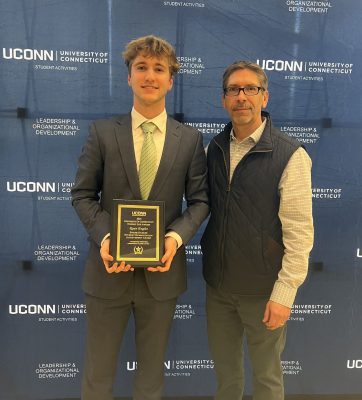
Student Spotlight: Ryan Engels
Internship Assignment: Interning with the IMRP’s Connecticut Racial Profiling Prohibition Project (CTRP3)
Hometown: Westbrook, CT
Year of Study: Junior
Major / Area of Study: Political Science, MPA 4+1 Fast-Track program
Anticipated Graduation: May 2027
1. Why did you choose UConn?
I always knew I wanted to attend UConn – it was in my blood. My older brother, mother, aunt, and uncle are all alumni, and my grandmother worked in university administration, so it wasn’t really an option not to apply. It turned out to be a great decision, especially because of the internship opportunities. I learned about the MPA 4+1 program as a sophomore and applied immediately. Its value is immense, and I knew it would set me up well for a career in public administration and public service.
I wanted other young people to focus their attention on the areas where they could have the biggest impact: their communities.
2. How did your interest in politics develop?
I didn’t become interested in politics until my senior year of high school, though I’d always loved history. The career coordinator at my school recommended an internship at a local law office, which revolved around land use law. I attended local board and commission meetings and reported back to the attorney on changes in regulations or real estate developments. I was captivated and soon began looking for ways to get involved in my town.
When I noticed a vacancy on a land use commission, I wrote a letter of interest to my First Selectman as soon as I turned 18. A month later, I became the youngest commissioner in town history. Two years later, I’m now the youngest chair of a town committee – and I’m running for elected office on the Zoning Commission. Growing my experience, I hope to keep developing my decision-making and leadership skills while bringing a youth perspective to ensure we’re building a community for the future.
3. Tell us about the organization you founded – CYPAC – the Connecticut Youth Political Advocacy Center.
I founded the Connecticut Youth Political Advocacy Center (CYPAC) as a freshman at UConn – from my dorm room in New Haven Hall. CYPAC is a nonpartisan organization dedicated to the advocacy, civic engagement, and youth participation at the state and local levels of government. The idea came from my own experience as a land use commissioner, where I noticed a lack of engagement from young people in state and local politics. I saw that when young people did engage, they focused on national politics, but the biggest impact can be made right in our communities.
4. How has the organization grown since its inception and what are your hopes for its future?
Since CYPAC’s inception in 2023, the organization has grown beyond what I ever imagined. We began by posting infographics on social media, but within a year launched an internship database, legislative priorities, a mentorship program, educational events, voter booklets, and had grown our social media following to over 1,000 followers across platforms. Since then, our membership has doubled to over 100 members representing all eight counties and more than half of Connecticut’s towns. My hope is that we can continue the trajectory we’ve been on. I’ve been fortunate to have a great team of other young people around me, and I know our impact on civic engagement across the state will continue to be a force for good.
Especially today, it couldn’t be more important for young people to be politically engaged… The biggest impact can be made right in our communities.
5. Why is it important for young people to be politically engaged?
Especially today, surrounded by misinformation and rising polarization, it couldn’t be more important for young people to be politically engaged. We need to understand that who we elect – from our local school board to Congress – affects our lives, from property taxes to healthcare. Even if it’s just voting once a year, every act of civic engagement matters.
6. How did you learn about the IMRP and how do you explain the Institute to people unfamiliar with it?
I learned about the IMRP through my Intro to Public Policy professor, Ken Barone, who serves as Associate Director at the Institute. I was eager to explore ways to get involved in criminal justice policy and contribute to meaningful, sometimes overlooked, work. I would describe IMRP as a policy implementer – particularly in the criminal justice sphere – turning the recommendations of statutory bodies like the Connecticut Sentencing Commission and Connecticut Racial Profiling Prohibition Advisory Board into actionable, digestible policy.
7. Tell us about your work with the CTRP3. What have been the most interesting parts thus far and why is this work important to you?
The Connecticut Racial Profiling Prohibition Project (CTRP3) collects, analyzes, and reports data from police departments to ensure compliance with the Alvin W. Penn Racial Profiling Traffic Stop Law. I’m collecting and organizing data from Inspector General Use of Force Reports to help inform State’s Attorneys and IMRP on police use of force statewide. The most interesting part so far has been participating in CTRP3 Advisory Board meetings, where leaders from the Connecticut State Police, Department of Emergency Services and Public Protection, Office of the Chief State’s Attorney, and others share their input on proposed policies and research.
As someone interested in pursuing a career in the public sector, I recognize that accountability, transparency, and fairness are essential. Legislators and the public alike need access to data about public servants – especially police officers. Historically, the criminal justice system has disproportionately affected marginalized groups, which makes this work especially important.

8. Outside of this internship, how do you spend your time on campus?
Back in Storrs, I serve as president of my fraternity, as a senator in the Undergraduate Student Government, and am actively involved in HuskyTHON – a year-long fundraising campaign benefiting Connecticut Children’s Hospital. I’ve been involved with all three organizations since my freshman year and have loved every second. In my free time, which I don’t have much of, I enjoy spending time with my friends and running which I recently got back into.
9. What are your future career aspirations and how will your work with the IMRP further your goals?
After graduation, I plan to complete my M.P.A. through the School of Public Policy Fast-Track Program and then attend law school. I hope to continue my journey in public service with the Office of the Connecticut Attorney General or the U.S. Department of Justice. Long-term, I aspire to run for office and use my experience to give back to my community.
Through IMRP’s various justice-related initiatives, I’ve seen how the General Assembly and state government collaborate with policy institutes and researchers like ourselves. I’ve experienced firsthand how the policy work gets done behind the scenes, inspiring me to continue to engage with the policy research opportunities that are so abundant here at UConn. Unlike many internships, I’m actively engaging in work every day that contributes to a fairer Connecticut – I couldn’t imagine a better foundation for a career in public service.
Get involved in your community – a cause will find you.
10. What advice do you have for other undergraduate students looking to get involved in meaningful causes?
My advice is simple: get involved in your community – a cause will find you. Whether on campus or in your hometown, there are plenty of opportunities to make a difference. And if you can’t find one, create one. When I first got started, I wasn’t sure what resonated with me, but through service as a land use commissioner I found my passion for civic engagement and local government. I then built CYPAC, and my public service continued to grow from there.
Whether on campus or in your hometown, there are plenty of opportunities to make a difference. And if you can’t find one, create one. When I first got started, I wasn’t sure what resonated with me, but through service as a land use commissioner I found my passion for civic engagement and local government. From there, I built CYPAC and continued to grow my public service.